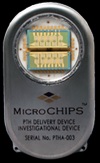 |
| Drug-delivering chip from MicroCHIPS--Courtesy of MicroCHIPS |
A new contraceptive implant developed by Lexington, MA-based MicroCHIPS could give women remote-controlled access to their hormone administration, offering up to 16 years of specifically dosed delivery and thus more authority over their birth control regimens.
The MIT partner uses technology that came about, according to the MIT Technology Review, after Microsoft's Bill Gates asked MIT professor and entrepreneur Robert Langer whether a long-term, controllable birth control option could work in reality. For that, Langer turned to the controlled-release microchip technology he and fellow inventors had licensed to MicroCHIPS.
The microchip, implanted under the skin in a patient's buttocks, upper arm or abdomen, has reservoirs that hold drugs in the body for long periods of time, according to the company. Each reservoir is sealed with a titanium and platinum seal, which melts temporarily when hit with an electrical current, allowing the release of the drug. They can deliver the drugs in response to certain stimuli, on a programmed schedule or wirelessly on demand.
For the sake of contraception, the chip would be programmed to release 30 micrograms of the hormone levonorgestrel a day--unless it's turned off via a remote control, allowing the woman to conceive. This regimen could ultimately last 16 years at a time, a huge step beyond the 5-year lifespan of today's longest-lasting contraceptives.
 |
| Microchip with implant--Courtesy of MicroCHIPS |
"The idea of using a thin membrane like an electric fuse was the most challenging and the most creative problem we had to solve," MicroCHIPs president Robert Farra said in a statement. Ultimately, the company is aiming for a 2018 market release, but the program is in its early stages still.
"The ability to turn the device on and off provides a certain convenience factor for those who are planning their family," Farra told the BBC.
MicroCHIPS has used its technology to deliver drugs to treat osteoporosis, multiple sclerosis and hypoglycemia. Their osteoporosis chip in particular has undergone human trials and in 2012 demonstrated the ability to deliver the treatment PTH(I-34) as programmed, reducing dose-to-dose variation, according to a study in the journal Science Translational Medicine.
 |
| Robert Langer |
Langer said in a statement at the time: "The convergence of drug delivery and electronic technologies gives physicians a real-time connection to their patient's health, and patients are freed from the daily reminder, or burden, of disease by eliminating the need for regular injections."
- here's the MIT Technology Review report
- and here's the BBC article
Editor's Corner: Delivery guru Robert Langer discusses nanomeds, up-and-coming ventures, new frontiers